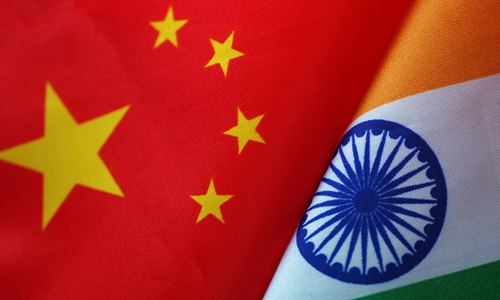India should not be instigated by US or media hyping: Global Times editorial
Source:Global Times Published: 2020/6/5 19:06:32

Photo: IC
Chinese and Indian military officials, led by lieutenant generals from both sides, will hold a meeting on Saturday, according to Indian media. This has brought hope for the two countries to further ease tensions on border issues. The two armies had disputes in the Galwan Valley region and other areas near the Line of Actual Control (LAC), and both countries' soldiers were injured. It is understood that the incident was caused by India's infrastructure construction along disputed territory.
Chinese and Indian officials have kept a low profile on the border frictions. Some Indian media used "Chinese aggression" to describe the situation, but instead of echoing the tough wording, Indian Defense Minister Rajnath Singh said the perception of the LAC between China and India is different. The US wants to interfere in the dispute, but neither China nor India accepted it.
The China-India border line and the LAC are still unclear. In the past, the two militaries had few chances to encounter during patrols. But as both militaries are increasing their modernization level, their infrastructures are also extending to the border areas, leading to more disputes.
China and India regard development as their priority, and neither country has the will to escalate the border conflict. However, the US has long begun to strategically suppress China and support India, and has implemented an Indo-Pacific Strategy in recent years. India has gradually formed an illusion of strategic superiority toward China. Some in India feel China may make concessions on the border issue, believing China is afraid of falling foul of India and India can win more interests by nibbling up the border.
Such a mindset is rising in India and has seemingly put pressure on Indian policymakers. It has somewhat affected the 2017 Doklam standoff and the disputes in the Galwan Valley region this year. Chinese and Indian leaders held an informal summit in 2018 and reached an important consensus. The two countries' high-rank officials had frequent contacts over the past two years, and Indian leaders showed strategic calmness. Hopefully, such calmness will play a leading role in India's affairs toward China, especially the border issue.
India should not be fooled by the US. Washington is keen on placing a wedge between countries and drawing countries to its own side. But this serves the US' strategic pressure on China, instead of other countries' geopolitical interests.
Washington looks forward to the China-India dispute in order to gain from it. The US supports India every time China and India have conflicts to encourage New Delhi's confrontation against Beijing and to hype new border disputes.
China does not want to fall foul of India. Good-neighborly relations have been China's basic national policy over the past decades, and China firmly adheres to a peaceful resolution of border disputes. We have no reason to make India our enemy.
But China will not give up any inch of territory. Once India makes a strategic misjudgment and nibbles away at China's territory, China will never condone it. China is bound to make strong countermeasures. We believe India knows very well that China will not be at a disadvantage in any China-India military operations along the border area.
The US and its allies have established various contact mechanisms with India, making India falsely believe that it is well-supported. But for major powers like China and India, external factors will not substantially affect their relations.
With China-India cooperation, India will enjoy a peaceful international environment. But if the two countries face a showdown on the border issue, the entire Himalayan region and the Indian subcontinent will face instability. No external force can change this. Maintaining peace along border areas and friendly cooperation is in line with the two countries' interests.
As China has made clear its friendly policy toward India, India should return the favor instead of being fooled by Washington. China's strategic situation is not that terrible. Since we do not fear US suppression, how can we allow some force to use US support to make trouble for China?
China appreciates some Indian policymakers' rationality at critical moments. Hopefully, India's public opinions will not be hotheaded or conceited. We hope they can contribute to the peace and stability along border areas, instead of hyping the situation and forcing the Indian government and military to advance rashly.
Posted in: EDITORIAL